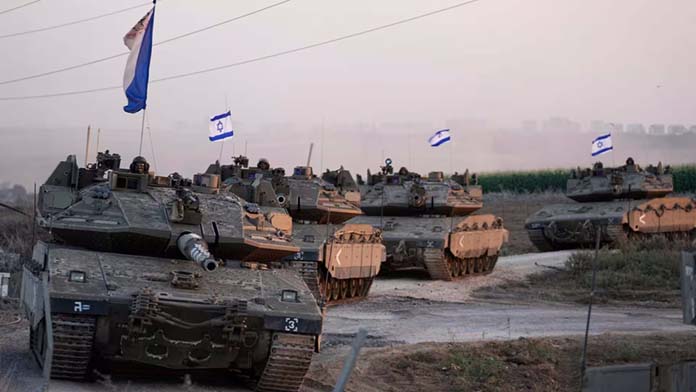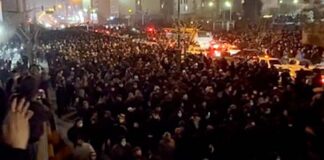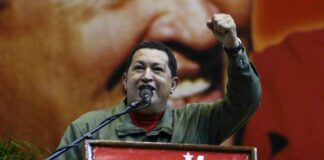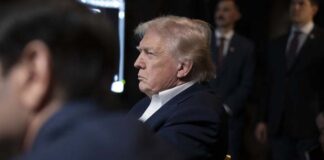Isabel Ringrose explains that imperialism is about more than major countries dominating the smaller ones
Brutal, violent and deadly. That summarises the system behind the Israeli assault on the Palestinians.
This is a genocide unfolding not on the fringes of the world system, but with the full backing and supplies of arms from the world’s major power the US, as well as European nations and Australia.
Many people use the word imperialism to describe the structure that produces such horror—and that’s right.
But the term is used in many different ways. One common usage is to describe the process whereby bigger states bully and oppress smaller ones.
Another is the way great powers seek to extract or control the raw materials and other resources of weaker countries.
Both of those are features of imperialism.
But for Marxists imperialism is a specific phase of capitalism that emerged in the years before the First World War—and led to the most terrible bloodletting in history up to that point.
Imperialism is a product of a system based on ruthless competition for profit. Capitalism sees economic competition between rival companies produce vast sums of wealth, which is concentrated into the hands of a tiny minority at the top of society.
There are now around 2600 billionaires globally who hold $18 trillion between them. The world’s top 1 per cent hold 44.5 per cent of global wealth.
This ruling class and its hangers on are prepared to use force to defend their wealth and privileges if necessary—not just against the workers they exploit but against each other.
Ferocious capitalist rivalry has caused appalling levels of armed conflict and suffering for people across the world.
Imperialism is inseparable from the competition that also develops between rival capitalist states that struggle for domination economically and often militarily.
The Russian revolutionary Vladimir Lenin wrote his short book Imperialism: The Highest Stage of Capitalism in 1916 to explain the economic underpinning of the war and the features of a global system of conflict between capitalist states.
He wrote, “Imperialism means the partitioning of the world” and “High monopoly profits for a handful of very rich countries.”
Some at the time thought that the terrible destruction war unleashes, and the chaos it would cause for capitalist profits, meant the rich and powerful would increasingly avoid war.
Contrary to those who argued that bosses and states would cooperate with each other and become a force for peace, Lenin said that any balance of power between the contending imperialists could only be temporary.
When the economic weight of one state or group of states shifted new bloody struggles burst out, destroying any agreements peacefully to divide the world market made previously.
The early stage of capitalism sees relatively small firms competing with each other mainly inside a domestic market.
But the process of competition sees some crush their adversaries. The victors emerge bigger, more powerful and ready to expand internationally.
As they move beyond the home market, they demand their state backs them to ensure smooth profit-making. Sometimes they also want armed force to batter down barriers to trade or to clear out “unhelpful” rulers.
The gunboat blasting away on some foreign shore became a key symbol of the British Empire because of this method.
Imperialism is the fusing of economic and geopolitical competition. And states’ warmongering also reacted back on economic systems.
Shifting balance of power
Fifty years before the First World War Britain was the dominant industrial power. But in the run up to the war, Germany was challenging it as the second biggest economy.
Germany and other states challenged Britain militarily, and economically.
At some points, such as at the Congress of Berlin at the end of the nineteenth century, all the powers could agree to divide up Africa between them—without involving any Africans, of course. But when almost all such sharing of the spoils was exhausted, any new expansion could happen only by taking away from some other state.
No state was content to “freeze” its areas of domination and control. Instead their economic accumulation led to world war.
Victory for Britain and its allies in 1918 pushed back others for a time. But it could not indefinitely block the rise of other European powers like Germany and, in particular, the United States.
As Russian revolutionary Leon Trotsky wrote, “During the war, the enormous economic preponderance of the United States was developed and revealed in its full proportions.
“The emergence of that country from the stage of an overseas provincialism suddenly forced Great Britain into second place.”
This mismatch of political structures, economic power and international control was the basis of the Second World War. And that war intensified the rise of the US and its imperialist rival the USSR.
As late as 1939 the US lay at number 19 in the league table of military power—behind Portugal.
But between then and its entry into the war in late 1941, the US increased its armed forces eightfold to 1.5 million people.
A changing world
Imperialism has constant features, but it also shifts and changes in very important ways.
In one phase a “multipolar” world saw six or more imperialist countries slug it out.
After the Second World War, two great blocks confronted each other. The US forced states to bend to its will either through economic pressure or by violence. It fixed elections, eliminated leaders who seemed a threat, and sent troops to ensure domination.
The US, for example, overthrew the Iranian government of Mohammed Mossadeq in 1953 because he nationalised the country’s oil industry.
It fought years of war in Vietnam, murdering 1.5 million Vietnamese people and hundreds of thousands in neighbouring Cambodia.
Meanwhile the USSR invaded Czechoslovakia in 1968 and backed its friends when they crushed workers’ uprisings.
State capitalism in Russia and capitalism in the US drove each to produce more industrial output and grab more geopolitical influence than the other.
The Cold War between the two blocks at points threatened to become a hot war—fought with nuclear weaponry. Workers and the poor everywhere lost out.
That’s why the political tradition Solidarity comes from put forward the slogan “Neither Washington nor Moscow but International Socialism.”
At the end of the Cold War, the US was the dominant superpower but this was far from the “end of history” as some supporters of neoliberalism predicted. Economic power has continued to shift.
In 1980 Russia produced 14.8 per cent of global manufacturing output, about half the US share of 31.5 per cent. Thirty years later Russia accounted for just 3.2 per cent of world gross domestic product, and the US share had fallen to 22 per cent.
The rise of Japan, China and others has squeezed US economic dominance, so it massively stepped up its military spending to compensate.
But the other problem for imperialism is that its victims have rarely accepted their fate without resistance. People across the world rose against the British, French and Spanish empires, even when they were outgunned by the imperialists.
And eventually they won, either by defeating the empires or by sending enough fear through them to prompt their withdrawal.
The US lost in Vietnam, just as the French had done in an earlier period. Despite mounds of dead and the destruction of a whole society, the US lost in Iraq and then in Afghanistan.
US President Joe Biden humiliatingly withdrew US forces from Afghanistan in order to concentrate on the rivalry with China.
Today the rival imperialist powers of the US and Russia are again fighting each other through a proxy war in Ukraine. Russia is trying to show that it can still act on the world stage.
And, through the NATO military alliance, the US has marshalled its allies to pour in weapons to boost the Ukrainian forces.
Revolt against war
It is possible to win a world without war. But the solution isn’t to back one imperialist against the other—it’s to tackle the system that produces war and competition head on.
That means solidarity and support for the oppressed peoples and nationalities that revolt against imperialism.
This can weaken the imperialist power overseas and also at home, giving more space to revolutionary movements.
It means backing liberation movements and turning the fight against imperialism on our leaders.
Australia is locked into an alliance with the US and backs it whether it comes to killing Palestinians or sending troops and money to Ukraine.
A blow to the ruling class here can mean a blow to imperialists across the world, and be a spark for revolt. The First World War came to an end through revolutions in Russia and then Germany.
This encouraged the anti-colonial and anti-imperialist movements everywhere. Fighting for a free Palestine seeks to strike a blow to imperialism—smashing Israel and its backers.
That could detonate wider uprisings in the Middle East and internationally. But ridding the world of imperialism also means widening the battle and striking at the very capitalist system that causes war and competition in the first place.
Republished from Socialist Worker UK






